 |
Picks is a monthly sampling of Japan's art scene, offering commentary by a variety of reviewers about exhibitions at museums and galleries in recent weeks, with an emphasis on contemporary art by young artists. |
 |
 |
 |
16 December 2019 |
 |
| 1 | 2 | |
 |
|
 |
 |
|
|
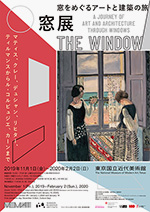 |
 |
 |
 |
| The Window: A Journey of Art and Architecture through Windows |
| 1 November 2019 - 2 February 2020 |
The National Museum of Modern Art, Tokyo
(Tokyo) |
 |
| An assemblage of art of all kinds -- paintings, photographs, videos, installations -- on the theme of windows. Greeting you upon entry is a screen showing a scene from a Buster Keaton film. One work that struck a fond chord was Mado (Window) by the Kansai art unit The Play. When asked to submit a work for a museum exhibition in 1980, they had proposed removing one of the windows from the gallery wall and displaying it. Though the museum initially rejected the idea out of hand for security reasons, the group went through all the necessary hoops and ultimately got their way. |
|
|
 |
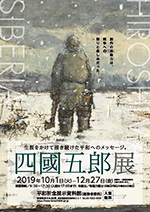 |
 |
 |
 |
| Goro Shikoku |
| 1 October - 27 December 2019 |
Memorial Museum for Soldiers, Detainees in Siberia, and Postwar Repatriates
(Tokyo) |
 |
| In the final days of World War II, many Japanese soldiers were captured on the Asian mainland by Soviet troops and sent to camps in Siberia, where they endured years of forced labor before repatriation. Among the survivors were a number of artists; one, Goro Shikoku (1924-2014), left a legacy of paintings depicting his three years in Siberia. Of special interest is one work that blends a scene of Japanese prisoners marching under Soviet guard with an image of the artist painting the scene in 1991, when he visited the site of the camp: memory superimposed on memory. |
|
|

|
 |
 |
|
 |
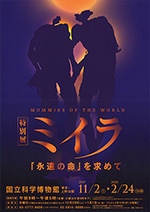 |
 |
 |
 |
| Mummies of the World |
| 2 November 2019 - 24 February 2020 |
National Museum of Nature and Science
(Tokyo) |
 |
| A close look at mummies, revealed as never before thanks to state-of-the-art research and technology. The show brings together mummies from around the world, categorized by region. Though Japan's climate makes the country less than ideal for mummification, several natural mummies have been discovered at Edo-era sites. One on display here, the sokushinbutsu (Buddha-in-this-life) of Kanshuji temple in Fukushima Prefecture, is a Buddhist priest who starved himself to death to attain enlightenment at age 92 in 1683. Still wrapped in a monk's robes, he has been preserved as an object of worship for over 330 years.
|
|
|
|
|
|
|
|

|
 |
 |
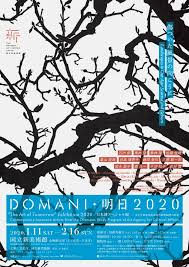 |
 |
 |
 |
| "DOMANI: The Art of Tomorrow" Exhibition 2020 |
| 11 January - 16 February 2020 |
The National Art Center, Tokyo
(Tokyo) |
 |
| Since 1967 Japan's Agency for Cultural Affairs has been fostering the development of young artists through its Program of Overseas Study for Upcoming Artists. The annual DOMANI show, now in its 22nd year, presents the work of participants in that program. Opening in the New Year, the 2020 iteration, subtitled "Landscapes in Our Age: Scarred and Reborn," introduces nature-themed works by 11 of these artists, many of them addressing natural and man-made disasters. |
|
|
 |
 |
 |
 |
| Sakata Kazuo: Recoup Lost Ground |
| 7 December 2019 - 26 January 2020 |
Tokyo Station Gallery
(Tokyo) |
 |
| An avant-gardist who lived in France from 1921 to 1933, Sakata (1889-1956) grasped the essence of cubist and subsequent abstract painting, taking its possibilities even further in his own work. Artist and historian Kanjiro Okazaki, who was invited to curate this show, analyzes how Sakata imparted volume to elements normally treated as background, then multiplied and folded them. A section that compares Sakata's work after his return to Japan and into the postwar years with that of other artists of the day testifies to the problem-solving power inherent in painting. |
|

|
 |
 |
 |
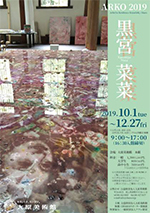 |
 |
 |
 |
| ARKO 2019: Nana Kuromiya |
| 1 October - 27 December 2019 |
Ohara Museum of Art
(Okayama) |
 |
| Kurashiki's famed Ohara Museum has hosted the ARKO (for Artist in Residence Kurashiki, Ohara) program since 2005. Kuromiya, who was in residence during the summer of 2019, paints a variety of motifs in a style that accentuates bleeding, blurring, and other traces of the painting process with a translucent, glaze-like luster and smooth, photograph-like coloration. Here she has applied this unique approach to works referencing the world of Seishi Yokomizo, a mystery writer who once lived in Kurashiki. |
|
|
 |
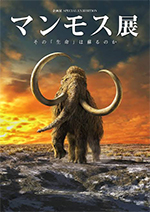 |
 |
 |
 |
| Special Exhibition: The Mammoth |
| 23 November 2019 - 23 February 2020 |
Fukuoka City Science Museum
(Fukuoka) |
 |
| In recent years, global warming has made it possible to excavate the carcasses of mammoths, the giant mammals that went extinct some 4,000 years ago, from permafrost in places like Sakha (or Yakutia), a Russian republic in Siberia. This show offers an opportunity to view several rare frozen specimens, some on public display for the first time. The story of the mammoth is intertwined with the future of the life sciences, as exemplified by Kindai University's "Mammoth Revival Project." The reappearance of these ancient creatures with the thawing of the permafrost poses some profound questions for scientists. |
|
|
|
|
|
|
|
|
 |
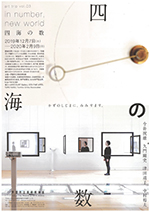 |
 |
 |
 |
| art trip vol. 03: in number, new world |
| 7 December 2019 - 9 February 2020 |
Ashiya City Museum of Art and History
(Hyogo) |
 |
| Four artists -- Norio Imai, Tsuyoshi Hisakado, Michiko Tsuda, and Yuta Nakamura -- present works on the theme of numbers. They include a contemplation of time through photographs and videos; an installation utilizing the immaterial phenomena of sound, light and shadow; and a video piece created by interactions between performers and space. Collectively the works heighten awareness of how our perception of "numbers" varies with our own value systems. |
|
|
|
|
 |
|